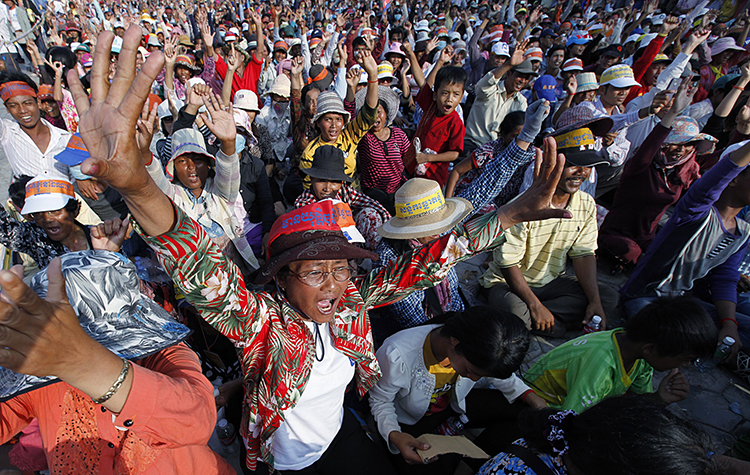(Bangkok/Geneva, 27 March 2017) – The 34th regular session of the UN Human Rights Council saw continued attention to the human rights situation in Cambodia. It was mentioned in two different debates at the sessions on 8-9 March, and on 22 March in statements by the UN High Commissioner for Human Rights, the EU, France, Japan, UK, and U.S.A.[1] While the renewal of the Memorandum of Understanding (MoU) with the Office of the High Commissioner for Human Rights (OHCHR) for another two years was positively noted, several States expressed concerns on shrinking democratic space in Cambodia ahead of its upcoming communal elections on 4 June. Concerns were also expressed on the continued detention of human rights defenders, including that of Ny Sokha, Yi Soksan, Nay Vanda, Lim Mony, and Ny Chakrya.
On 8 March, in his annual report[2], the UN High Commissioner for Human Rights highlighted threats to the right to freedom of expression and against members of opposition parties in the pre-electoral period, and drew attention to the arbitrary detention of human rights defenders associated with the Cambodian Human Rights and Development Association (ADHOC), as well as thousands of others without benefit of due process. The High Commissioner stressed, ‘that credible elections must be grounded in guarantees that courts will be independent and impartial, and that the freedoms of expression, peaceful assembly and association will be protected’.
During the session, the Asian Forum for Human Rights and Development (FORUM-ASIA) continued to highlight the need for the Council’s attention on Cambodia. Prior to the March session, FORUM-ASIA criticised the recent amendments to the Law on Political Parties, which further restricts the rights to freedoms of expression and association. On 10 March, FORUM-ASIA called for the release of Ny Sokha, Yi Soksan, Nay Vanda, Lim Mony, and Ny Chakrya, and ending of the judicial harassment of Tep Vanny.[3] On 15 March, it called for the release of the detained human rights defenders and the amendment of all regressive laws.[4]
Unlike the September session of the Council, the March session did not have a dedicated debate on Cambodia. Given this, concerns expressed at this year’s March session show that continued deterioration of the human rights situation in Cambodia remains in focus at the international level. It is also clear from this that the international community sees the shrinking democratic space ahead of the upcoming elections in June, as well as the continued detention of human rights defenders, as key issues in the country.
***
For a PDF version of this press release, please click here.
For further information, please contact:
- Iniyan Ilango, UN Advocacy Programme Manager, FORUM-ASIA: [email protected]
[1] https://eeas.europa.eu/delegations/un-geneva/22435/hrc-34-eu-intervention-item-2-interactive-dialogue-high-commissioner-human-rights_ens;
http://www.geneve-mission.emb-japan.go.jp/itpr_en/statements_rights_20170313_3.html;
http://www.franceonugeneve.org/L-assistance-technique-apportee-par-le-HCDH-est-essentielle;
http://www.ohchr.org/en/NewsEvents/Pages/DisplayNews.aspx?NewsID=21316&LangID=E.
[2] https://documents-dds-ny.un.org/doc/UNDOC/GEN/G17/007/01/PDF/G1700701.pdf?OpenElement




